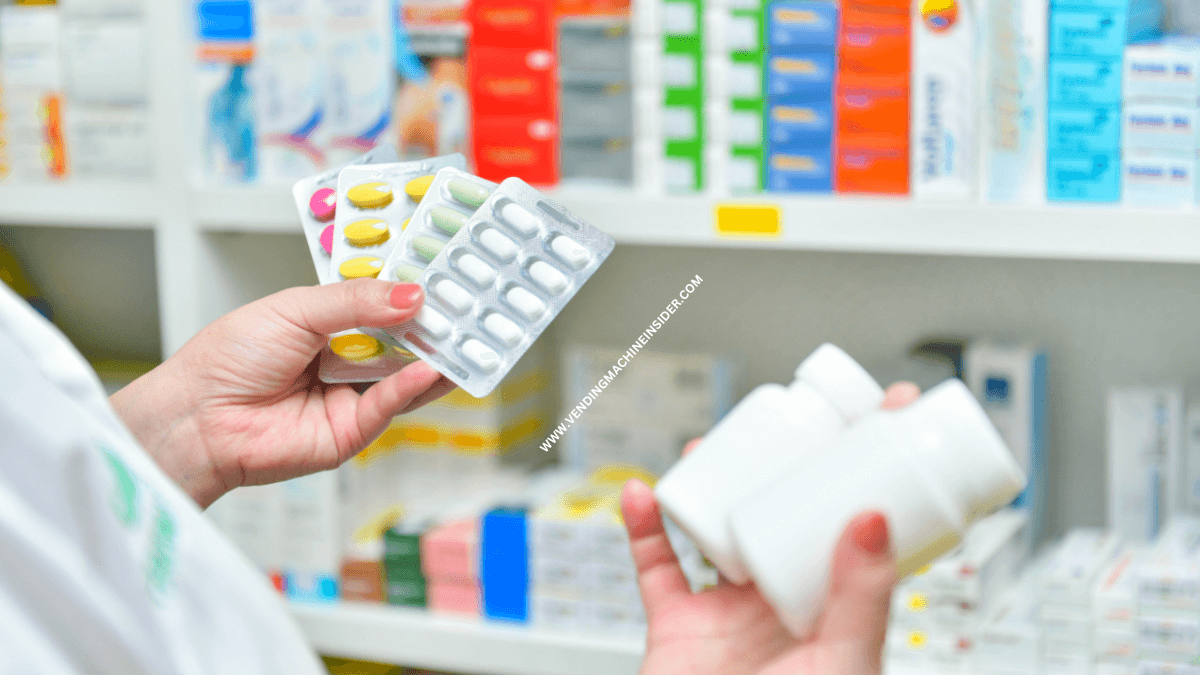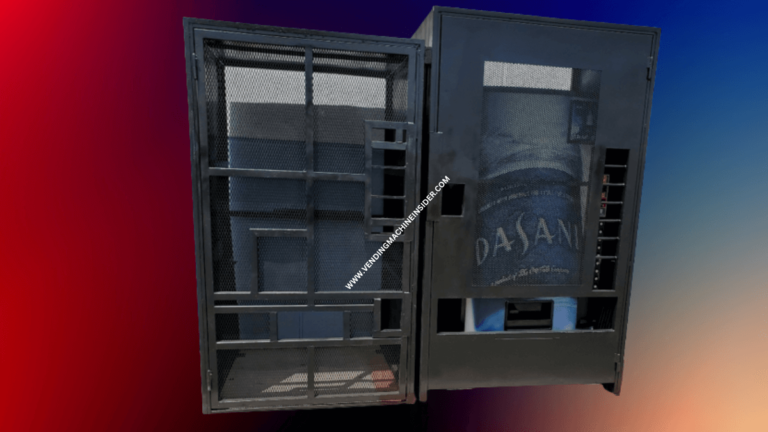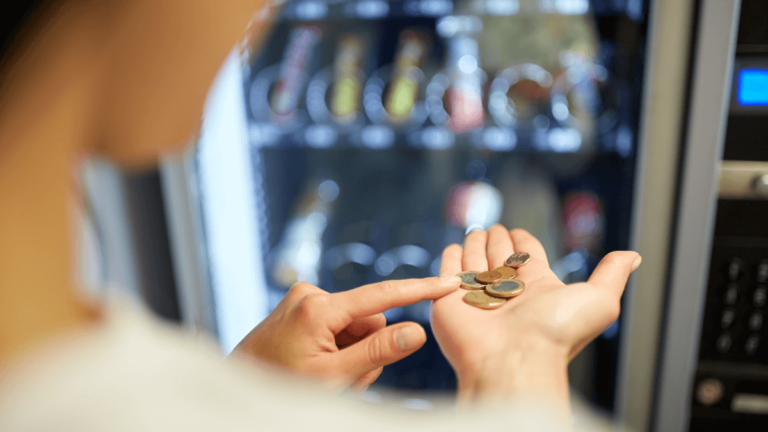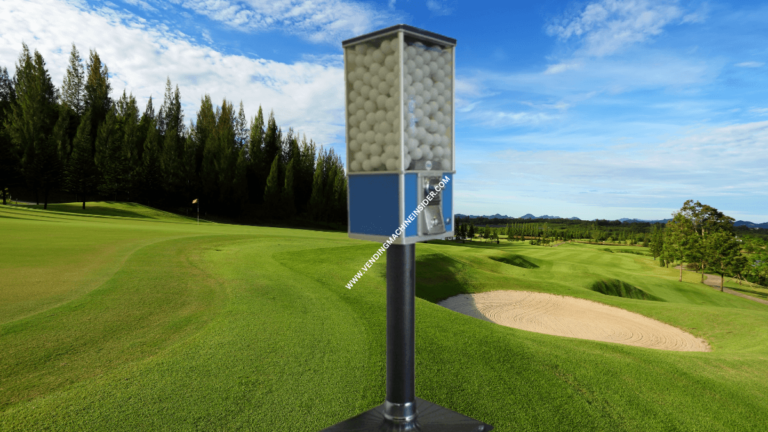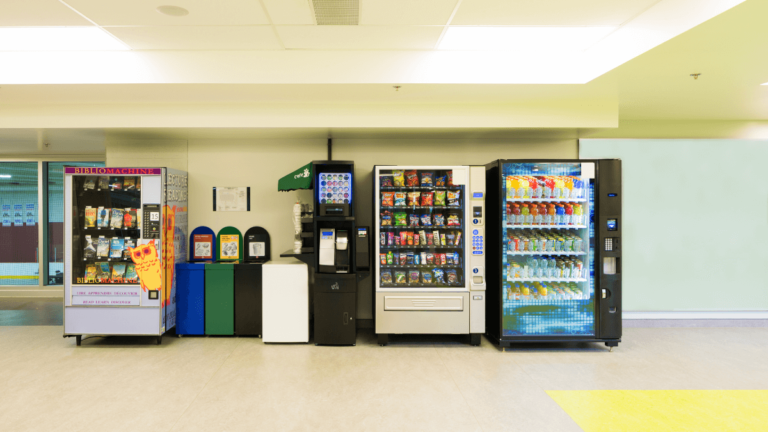5 Medicine Vending Machine Goals and Objectives: How it Works?
Have you ever heard of medicine vending machines? Machines that dispense medications similar to how vending machines dispense snacks and drinks!
These machines are becoming increasingly popular in many parts of the world, especially in areas where access to medical facilities is limited or in emergencies where quick relief is necessary.
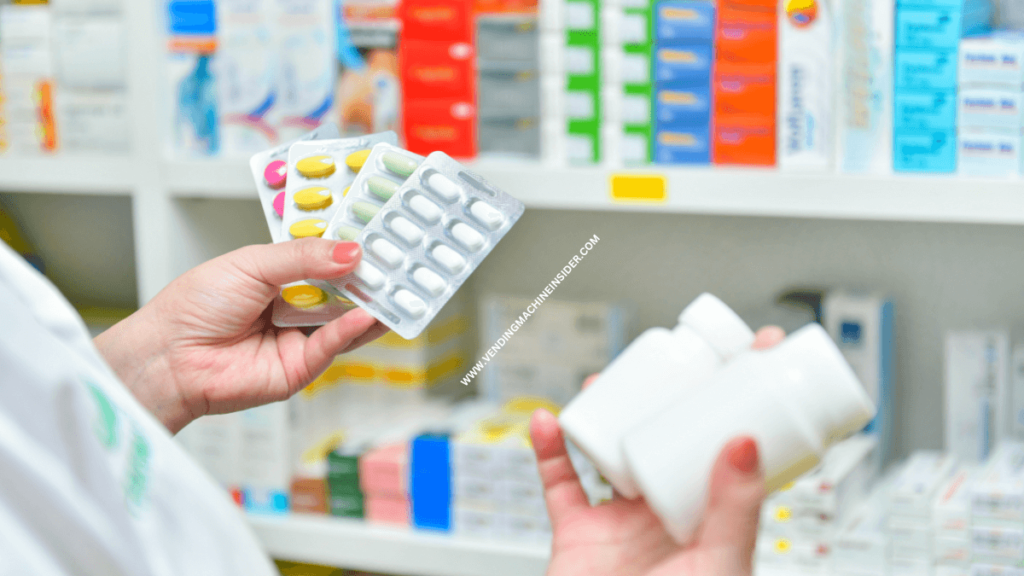
Medicine Vending Machine Goals and Objectives
Medicine vending machines are innovative and convenient solutions that offer numerous benefits to healthcare providers and patients. Below are some goals and objectives of medicine vending machines:
1. Improving Patient Experience
Medicine vending machines aim to improve the patient experience by providing easy access to medication. This is particularly useful when patients need immediate medicines but cannot visit a pharmacy.
2. Enhancing Convenience
The objective of medicine vending machines is to enhance convenience for both patients and healthcare providers. Medicine vending machines can be placed in various locations, such as hospitals, clinics, and public areas, to make it easy for patients to access medication.
3. Reducing Wait Times
The goal of medicine vending machines is to reduce wait times for patients. Instead of waiting in long lines at a pharmacy, patients can quickly obtain their medication from a vending machine.
4. Enhancing Medication Adherence
The objective of medicine vending machines is to enhance medication adherence. By providing easy access to medication, patients are more likely to take their medication as prescribed, which can improve health outcomes.
5. Improving Efficiency
The goal of medicine vending machines is to improve efficiency in healthcare facilities. Healthcare providers can spend less time dispensing medication and more time focusing on patient care.
Pros & Cons of Medicine Vending Machine
Here is a chart outlining the pros and cons of using a Medicine Vending Machine:
| Pros | Cons |
|---|---|
| Convenient and accessible | A limited selection of medication |
| Available 24/7 | No personal interaction with a pharmacist |
| Speedy dispensing of medication | May not accept insurance or provide discounts |
| May provide emergency access to medication | May not dispense prescription medication without special permission and regulatory approval |
| Can be located in remote or underserved areas | Maintenance and service can be costly |
| Helps to alleviate wait times at pharmacies | Concerns about the quality and authenticity of medication |
| Can be integrated with telemedicine for remote consultations | May not be regulated in some jurisdictions |
It’s important to weigh these factors carefully when considering whether a Medicine Vending Machine is the right choice for your medication needs.
How Do Medicine Vending Machines Work?
Here’s a step-by-step guide on how our medicine vending machines work.
Step 1: Select your Language and Payment Method.
Customers can choose their preferred language and payment method when approaching the vending machine, such as cash or card.
Step 2: Browse the available products.
Once payment is processed, customers can browse the available products on the machine’s touchscreen display.
Products are sorted into categories, such as pain relief, allergy relief, and first aid.
Step 3: Select your product
Customers can select the product they need from the displayed options.
It will provide product information and pricing details before the customer chooses.
Step 4: Retrieve your product
After selecting the product, the vending machine dispenses the medication and any accompanying information, such as dosage instructions and warnings.
Step 5: Receive your change or receipt.
If applicable, customers will receive any change due from their purchase.
They can also choose to receive a printed receipt for their records.
Step 6: Optional remote monitoring and restocking
The Vending machines come equipped with remote monitoring technology, allowing to keep track of inventory levels and restock products as needed, ensuring that customers always have access to the medical supplies they need.
Can Medicine Vending Machines Dispense Prescription Medication?
Yes, Medicine Vending Machine dispenses Prescription Medication but with some important caveats.
First and foremost, any vending machine that dispenses prescription medication must comply with federal and state regulations.
These regulations are in place to ensure the safe and legal distribution of prescription drugs.
Secondly, prescription medication vending machines require high security to prevent unauthorized access to the medications.
This includes biometric authentication, tamper-proof packaging, and remote monitoring to detect suspicious activity.
It’s also worth noting that not all prescription medications are suitable for dispensing through vending machines.
Controlled substances, for example, are subject to additional regulations and restrictions.
If you’re considering a prescription medication vending machine for your business or organization, be sure to work with a reputable provider who can ensure compliance with all applicable laws and regulations.
Where Can I Find Medicine Vending Machines?
If you’re looking for medicine vending machines, there are a few places to start your search.
1. Online retailers
Many online retailers sell medicine vending machines, including specialized vending machine suppliers and large retailers like Amazon.
2. Vending machine manufacturers
Companies that manufacture vending machines may also offer medicine vending machines as part of their product lineup.
3. Local vending machine suppliers
You can also try contacting local vending machine suppliers in your area to see if they offer medicine vending machines.
4. Pharmacies and hospitals
Some pharmacies and hospitals have begun implementing medicine vending machines to offer 24/7 access to certain medications.
Remember that regulations around the sale and dispensing of medications can vary by country and region, so check local laws and guidelines before making any purchases.
It’s essential to carefully consider the security and safety measures of any medicine vending machine you may be considering.
What are the Benefits of Using a Medicine Vending Machine
Here are some of the benefits of using this innovative technology:
1. Convenient Access
Medicine vending machines offer 24/7 access to various medications, making it easier for people to get the medication they need at any time.
2. Time-Saving
By eliminating the need to visit a pharmacy, medicine vending machines save time for busy individuals who may not have the time or ability to make an extra trip.
3. Secure and Controlled
Medicine vending machines are secure and controlled, ensuring only authorized individuals can access the medication.
4. Easy to Use
With simple instructions and easy-to-use interfaces, medicine vending machines are user-friendly and accessible to people of all ages and abilities.
5. Increased Accessibility
Medicine vending machines can be installed in a variety of locations, making medication more accessible to people in rural or remote areas, as well as in densely populated urban areas.
6. Reduced Costs
Medicine vending machines can help reduce the cost of healthcare by cutting down on overhead expenses associated with traditional pharmacies.
By utilizing medicine vending machines, people can experience a convenient and efficient way to access the medication they need, improving their overall healthcare experience.
Are medicine vending machines safe and reliable?
Medicine vending machines are designed to be safe and reliable for users. These machines are manufactured and installed by companies specializing in vending technology, and they are equipped with state-of-the-art features that ensure the safety of their users.
One of the critical safety features of medicine vending machines is their built-in security systems.
The systems are designed to prevent unauthorized access to the medication inside the machine.
It typically includes a lockable cabinet and a secure payment system ensuring only authorized users can access the medication.
Medicine vending machines are also designed to be reliable.
They are equipped with advanced technology to dispense medication accurately in the correct dosage and at the right time.
It ensures that users receive the medication they need precisely when needed.
What Types of Medicine can be Dispensed from a Vending Machine?
Typically, medicine vending machines can dispense over-the-counter (OTC) medications.
These include popular
- Pain relievers,
- Cough and cold medications,
- Allergy relief medications, and
- First-aid supplies.
However, the specific types of medication that can be offered may differ depending on the country or state regulations where the machine is located.
Sometimes, medicine vending machines may also carry prescription medications, but only with special permission and regulatory approval.
It’s important to understand that medicine vending machines are not intended to replace traditional pharmacies but to offer convenient access to OTC medications and first-aid supplies in areas that may not be easily accessible.
How Much do the medicines in the medicine vending machine cost?
Medicine vending machines conveniently purchase over-the-counter (OTC) medications and first-aid supplies.
The cost of the items in the vending machine will vary depending on the specific products and the machine’s location.
However, the prices are generally comparable to those found in traditional brick-and-mortar pharmacies.
Does the medicine vending machine allow insurance billing?
Typically, medicine vending machines do not allow for insurance billing.
Since they are designed to provide quick and convenient access to over-the-counter medications, customers are expected to pay for their purchases upfront.
Additionally, it’s important to note that prescription medications are typically unavailable in medicine vending machines, and those may require special regulatory approval and permission.
In such cases, insurance billing may not be an option.
What are the Payment options in a medicine vending machine?
Regarding payment options, medicine vending machines typically offer several choices to make the purchasing process as convenient as possible.
Here are some of the most common payment options available:
1. Cash
One of the simplest payment options is cash. Medicine vending machines have a slot where users can insert cash bills or coins. The machine typically has a bill validator and a coin dispenser to provide change.
2. Credit and Debit Cards
Most modern medicine vending machines have credit and debit card readers that allow users to pay with their cards.
These machines can process payments with major credit cards brands such as
- Visa,
- MasterCard,
- American Express, and
- Discover.
3. Mobile Payments
Some medicine vending machines also offer mobile payment options. This means users can pay using mobile devices such as smartphones or tablets.
Mobile payments can be made through mobile wallets or apps such as Apple Pay, Google Wallet, and Samsung Pay.
4. Contactless Payments
Another option that is gaining popularity is contactless payments.
These payments can be made using Near Field Communication (NFC) technology, where users wave their contactless cards or mobile devices over the machine’s reader to make a payment.
By offering multiple payment options, medicine vending machines provide users flexibility and convenience when purchasing.
What are the Regulations Surrounding Medicine Vending Machines?
These regulations can vary by country or state and may cover various aspects, including licensing requirements, security standards, medication storage and dispensing guidelines, and more.
Vending machine operators must comply with these regulations to avoid legal issues and ensure customer safety.
Some of the standard regulations surrounding medicine vending machines are as follows:
1. Licensing and permits
Medicine vending machines may require a special license or permit, depending on the location and type of medication dispensed. Operators should have the appropriate consent and permits before setting up a machine.
2. Medication Storage and Dispensing Guidelines
Regulations may specify requirements for medication storage and dispensing, such as temperature control, medication expiration dates, and security measures. Operators should follow these guidelines to ensure the safety and effectiveness of the medication.
3. Security Standards
Medicine vending machines may need to meet specific security standards to prevent theft, unauthorized access, and tampering. This can include features such as locking mechanisms, alarm systems, and video surveillance.
4. Advertising and Labeling Requirements
Regulations may require clear labeling and advertising of the medication and the vending machine, including information such as the medication name, dosage, and any warnings or side effects.
5. Compliance with Privacy Laws
Operators must comply with all relevant privacy laws when handling customer information, such as contact details and prescription history.
Vending machine operators need to stay up to date with any changes in regulations to ensure they are operating within the law and providing a safe and reliable service to their customers.
How Can I Ensure the Quality and Authenticity of the Medicine from a Vending Machine?
Here are some steps you can take to ensure that the medicine you obtain from a vending machine is legitimate and safe to use:
1. Check the labeling
All medicine dispensed from vending machines should have proper labeling, including the name of the drug, the dosage, the expiration date, and any relevant warnings or instructions.
2. Verify the source
Ensure a reputable and licensed pharmacy or healthcare provider operates the vending machine.
3. Look for regulatory approval
Medicine vending machines must comply with local regulations and laws. Look for regulatory approvals or certifications indicating the vending machine meets safety and quality standards.
4. Report any concerns
If you have concerns about the quality or authenticity of medicine dispensed from a vending machine, report it to the appropriate authorities, such as the FDA or local health department.
It’s important to remember that medicine vending machines are designed to provide convenient access to over-the-counter medication and first-aid supplies.
Still, they are not a replacement for traditional pharmacies or medical advice from a licensed healthcare provider.
How are Medicine Vending Machines Serviced and Maintained?
Medicine vending machines require regular servicing and maintenance to ensure optimal performance and reliability.
The frequency and extent of servicing vary depending on usage patterns and machine location.
However, some general guidelines and best practices can help ensure the proper upkeep of medicine vending machines.
1. Regular Cleaning
Regular vending machine cleaning is essential to maintain hygiene and ensure the safe dispensation of medication. The machine should be wiped down with a disinfectant regularly to prevent the spread of germs.
2. Inspect and Replace Stock
The vending machine should be regularly inspected to ensure it is stocked with fresh and authentic medication. Expired or damaged drugs should be removed and replaced promptly.
3. Preventive Maintenance
Regular preventative maintenance is essential to identify and fix minor issues before they become major problems. This can include tasks such as lubricating moving parts, inspecting electrical components, and calibrating sensors.
3. On-site Servicing
In the event of a malfunction, it’s essential to have a trained technician perform on-site servicing to minimize downtime and ensure the safety of the machine.
4. Remote Monitoring
Some vending machines are equipped with remote monitoring technology that enables real-time monitoring of the machine’s performance and alerts the operator in case of any issues. This can help detect and resolve problems before they cause any downtime.
In summary, regular cleaning, inspection, and preventive maintenance are vital to ensuring medicine vending machines’ optimal performance and safety.
Operators should also consider remote monitoring technology to enable real-time monitoring and rapid response to any issues.
Conclusion
In conclusion, medicine vending machines have been developed to provide a more convenient way for people to access over-the-counter medications and first-aid supplies.
Their objectives include:
- Reducing the time and effort required to obtain these items.
- Providing access to areas where pharmacies may not be available.
- Improving public health by making it easier for individuals to get the necessary medications.
Additionally, these machines are designed to comply with strict regulations and safety standards to ensure that the medications dispensed are of high quality and authenticity.
With continued technological advancements and improvements in service and maintenance, medicine vending machines have the potential to become an increasingly important part of our healthcare system.
Also Read: Dental Vending Machines: Get Dental Products On-the-Go!
